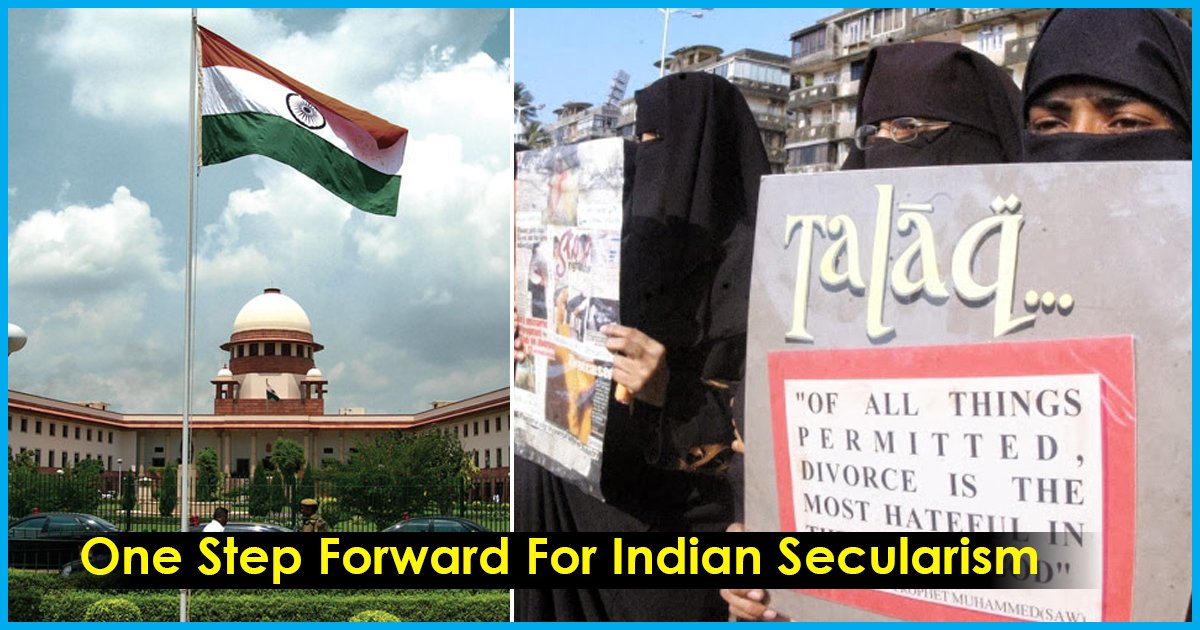
In A Historic Moment For Indian Secularism, SC Declares Instant Triple Talaq Unconstitutional
22 Aug 2017 6:54 AM GMT
Editor : Sudhanva Shetty Shetty
Writer, coffee-addict, likes folk music & long walks in the rain. Firmly believes that there's nothing more important in a democracy than a well-informed electorate.
Today, on August 22, in a historic verdict, the Supreme Court declared Triple Talaq as unconstitutional (verdict can be red here).
However, saying the practice cannot be done away with “hastily”, the Court gave the government six months’ time to draft a law on the matter.
In the meantime, Triple Talaq will be essentially suspended. The practice has been outlawed, voided, nullified.
Triple talaq – or, in particular, instant Triple Talaq – is the controversial Muslim divorce law that allows men to leave their wives immediately by uttering the word “talaq” (divorce) thrice.
A panel of five judges said that triple talaq “is not integral to religious practice and violates constitutional morality.”
Five judges of different faiths – Chief Justice Jagdish Singh Khehar, Justice Kurian Joseph, Justice Rohinton Fali Nariman, Justice Uday Umesh Lalit and Justice S Abdul Nazeer – heard the case over five days from May 12 to May 18.
The court called triple talaq “bad in law” and said: “We hope the legislature will consider and take into account Muslim Personal Law while making legislation. All parties must keep their politics away and decide this.”
More work left to be done
The Logical Indian has always been in the favour of banning triple talaq and we hope that the Supreme Court’s judgement helps the cause of thousands of Muslim women who fall prey to the cruelty of this practice.
Most movements against triple talaq suggest the need of a Uniform Civil Code (UCC), which would ensure justice for women in marriage and inheritance. But the question that needs to be asked here is – would this help women achieve an equal status as men in the society? A UCC is the first step, but it is not the final solution.
The Supreme Court is right in outlawing triple talaq, but we should also keep in mind that more work remains after that. Gender equality does not end with outlawing triple talaq. Even after a ban on triple talaq, would Sharaya Banu and thousands of other Muslim women like her not need to move the court for their rights? Even in Hindu divorce, the woman has to appeal to the court for her rights to maintenance, child custody, compensation, etc.
Women need to be made aware of their rights. Bringing them under a uniform law will only help when a patriarchal form of marriage is done away with, and the institution that lays gender roles and trains women to be ‘wives’ alone is repaired.
A historic verdict
At the same time, it is easy to grasp the historic nature of today’s verdict and its implications on our growth as a secular democracy.
Indian secularism has always proposed coexistence of religion and government.
On the contrary, Western secularism has always proposed the separation of religion and government.
It doesn’t take a genius to see the flaws of Indian secularism. It encourages a corrupt and dangerous nexus between government and religious institutions. By allowing personal laws and rejecting a uniform civil code, politicians continue to benefit from vote bank politics, religion continues to be powerful, and secularism continues to be incomplete.
Religion – any religion – has no place in public life. It is a personal matter. It should be isolated and not allowed to influence any law or policy matter. It’s better for a country’s progress if religion is thrown into the dustbin of history instead of being allowed to become more relevant as time passes.
The SC’s verdict is a massive victory for secularism and women’s rights. We, as secular Indians, must now fight harder so that religion’s influence ebbs and fades away.
Also read: All You Need To Know About Muslim Marriage And Triple Talaq
 All section
All section













